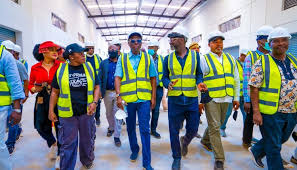Lagos Begins Construction of West Africa’s Largest Psychiatric Hospital to Tackle Gambling Addiction
Lagos Begins Construction of West Africa’s Largest Psychiatric Hospital to Tackle Gambling Addiction
By Achimi muktar
In a groundbreaking move to tackle the silent mental health crisis gripping Nigerian youth, the Lagos State Government has begun constructing what is set to become West Africa’s largest psychiatric hospital—a 500-bed facility with an additional 1,000-bed rehabilitation wing. The bold initiative is targeted at rising cases of gambling addiction and related behavioral disorders.
The announcement was made at the Gamble Alert Responsible Gaming Symposium in Lagos, where stakeholders from across Nigeria's health and gaming sectors gathered to confront the growing public health threat posed by the fast-expanding gambling industry.
Speaking on behalf of the Lagos State Commissioner for Health, Prof. Akin Abayomi, the Head of Special Projects and Mental Health, Dr. Tolu Ajomale, described the mega project as “a strategic investment directed by Mr. Governor to strengthen our mental healthcare system and address gambling as a growing public health concern.”
According to Abayomi, gambling addiction is fast becoming a hidden epidemic. Though legal and revenue-generating, gambling often comes with massive social costs: addiction, depression, debt, and a destabilized society—particularly for vulnerable youth and low-income communities.
“This is not just a health crisis—it’s a societal one. The rise of online gambling has exposed a dangerous gap in regulation and consumer protection,” Abayomi said.
He praised Gamble Alert for its advocacy and pledged the state’s support in pushing for stricter policies to regulate gambling platforms. A key part of the government’s plan includes introducing standardized self-exclusion tools and developing a centralized national database to track gambling-related mental health cases—currently scattered across healthcare providers, regulators, and operators.
In informal urban neighborhoods where betting kiosks dominate street corners, the Lagos Ministry of Health is also ramping up grassroots outreach through flyers, radio jingles, roadshows, and community forums.
“Our goal is to shift the culture,” said Dr. Ajomale. “We want responsible gaming to become the new norm.”
Fisayo Oke, Founder and CEO of Gamble Alert, emphasized that the goal of the symposium was to spark actionable change. “Responsible gaming isn’t just a slogan—it’s a business necessity,” he said. “Operators must invest in safer platforms, while players need education on gambling responsibly.”
Oke admitted that eliminating gambling-related harm completely may be unrealistic but stressed that coordinated prevention efforts can significantly minimize it. “Every sector—government, regulators, and the industry—must step up,” he said.
Adding his voice to the chorus, Olajide Boladuro, Director General of the Oyo State Gaming and Lottery Board, issued a stern warning to Nigerian youths: “Gambling is not a shortcut to success.”
Citing Oyo State’s tough regulatory stance since 2023—including licensing reforms and enforcement modeled after global best practices—Boladuro pointed to the UK’s £5 million fine on a betting firm for underage gambling as the type of accountability he wants replicated in Nigeria.
Oyo’s outreach now extends to rural communities like Fopa and Igbo Elerin, with the support of Governor Seyi Makinde. Boladuro emphasized the real-life consequences of gambling addiction, from anxiety and depression to suicide. “We must intervene early,” he said. “Gambling is not a job—it’s a game, and it should stay that way.”
As the symposium ended, the message was clear: Nigeria’s gambling industry must evolve into a safer, more responsible space—or risk losing the very consumers it thrives on. And Lagos, with its mega psychiatric project and sweeping health policies, is betting big to lead that charge.



















